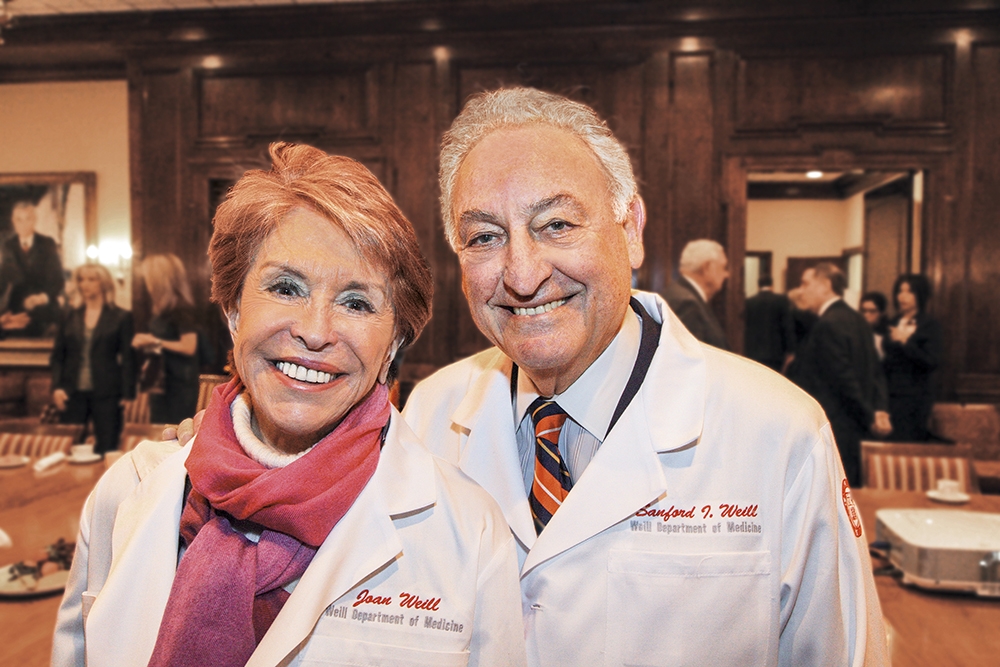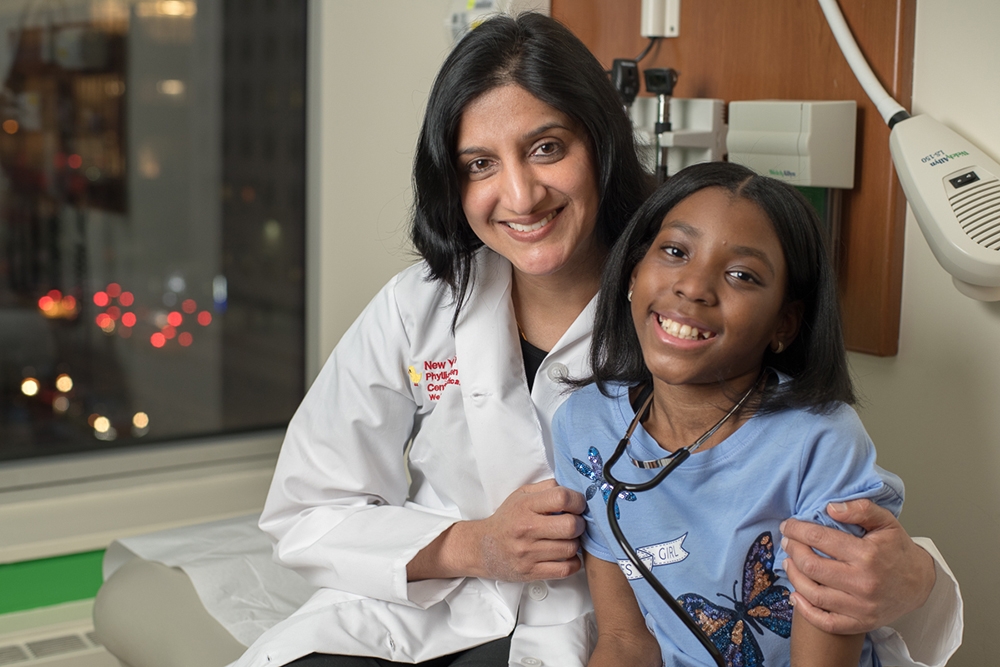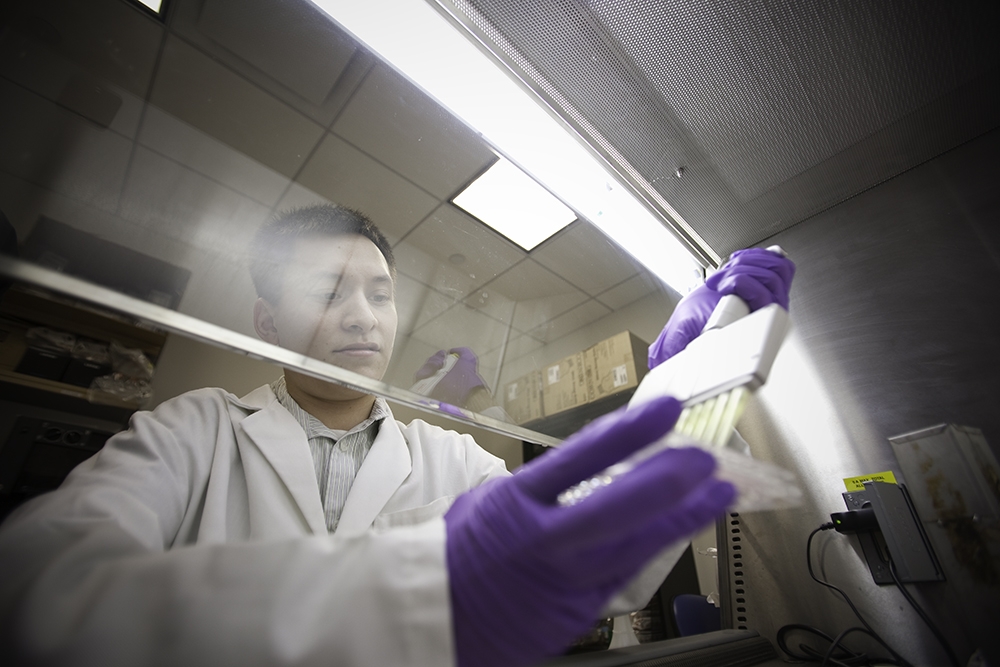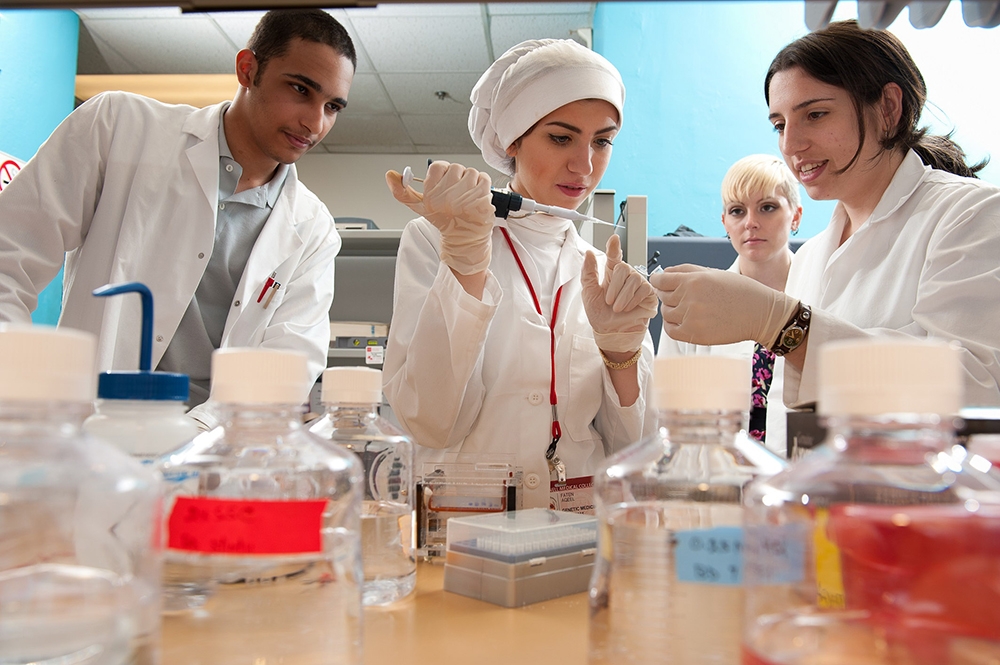For Weill Cornell Medicine, 1998 was a banner year. Amid its centennial celebration, the academic medical institution renamed itself in deep appreciation for Joan and Sanford I. Weill and their exemplary leadership, launching a bright, new era of dynamic expansion.
Powered by the renaming—and the Weills’ groundbreaking $100 million gift—Weill Cornell Medicine has transformed over the past two decades from a small Ivy League medical college to a formidable leader in global healthcare.

Joan and Sanford I. Weill
“As we fulfill our imperative to improve human health, we continue to make a significant impact on the lives of patients in New York and around the world,” said Dr. Augustine M.K. Choi, the Stephen and Suzanne Weiss Dean of Weill Cornell Medicine. “Our institution is truly a triple-threat powerhouse, with excellence in all parts of our mission to Care, Discover and Teach.
“We are incredibly grateful to have Joan and Sandy Weill as champions of our institution,” he added. “Their enthusiasm and generosity have led to a period of unprecedented advancement for Weill Cornell Medicine and positioned us at the vanguard of academic medicine.”
CARE
Weill Cornell Medicine’s compassionate, exemplary clinical care has always been at the heart of its mission – with physicians, researchers and educators collaborating to accelerate the pace of healthcare breakthroughs and improve patients’ lives.
Over the past two decades, Weill Cornell Medicine has dramatically expanded its clinical footprint and extended the range of services for patients, with more than 1,300 physicians currently providing care in 18 academic clinical departments at over 40 sites in New York City.

Credit: Roger Tully
In 2007, Weill Cornell Medicine opened the Weill Greenberg Center, the institution’s flagship ambulatory care facility at East 70th Street and York Avenue. The 13-story facility consolidated numerous clinical programs under one roof, providing patients with access to primary and specialty care, as well as imaging. The building also houses the Margaret and Ian Smith Clinical Skills Center, an advanced teaching center for medical students.
“Our visionary supporters understand that superior patient care requires collaboration across all facets of our mission,’’ said Jessica Bibliowicz, chairman of Weill Cornell Medicine’s Board of Overseers. “Our patients receive the best treatments possible, thanks to these important relationships between physicians, researchers and educators.”
As services for patients continued to expand, Weill Cornell Medicine – in partnership with NewYork-Presbyterian – broadened its reach throughout Manhattan and into Brooklyn and Queens, and added more than 550 physicians, 140 of them practicing at NewYork-Presbyterian/Lower Manhattan Hospital.
The institution’s worldwide network of collaborators also includes the GHESKIO Centers in Haiti, Weill Cornell Medicine-Qatar and global health programs on six continents.
DISCOVER
Over the past two decades, the research enterprise at Weill Cornell Medicine has expanded significantly, with increasing numbers of physicians and scientists working to speed the most innovative discoveries to patients in need. Weill Cornell Medicine’s collaborative programs and talented faculty continue to attract leading investigators dedicated to improving human health through cutting-edge translational research.

Credit: Roger Tully
The Belfer Research Building, which opened in 2014, best exemplifies this interdisciplinary, collaborative approach to biomedical research. The 18-story facility contains 13 floors of laboratories with numerous research hubs that focus on making the groundbreaking discoveries that can make a critical difference in patient’s lives. Some of the key institutes and centers headquartered in the Belfer Research Building include: the Helen and Robert Appel Alzheimer’s Research Institute, the Gale and Ira Drukier Institute for Children’s Health, the Caryl and Israel Englander Institute for Precision Medicine, the Feil Family Brain and Mind Research Institute, the Sandra and Edward Meyer Cancer Center, the Jill Roberts Institute for Research in Inflammatory Bowel Disease, the Joan and Sanford I. Weill Center for Metabolic Health and the Cardiovascular Research Institute.
The building – adjacent to the Weill Greenberg Center – has facilitated Weill Cornell Medicine’s bench-to-bedside efforts, helping speed newly discovered therapies to patients. More than 70 senior and early-career investigators have been recruited since the opening of the Belfer Research Building, leading to an approximate 25 percent increase in sponsored research funding at Weill Cornell Medicine.
The expanded capabilities in the Belfer Research Building have ushered in a new era in research, with computational biology and precision medicine playing an increasingly important role in developing targeted therapies for patients.
In addition, Weill Cornell Medicine has implemented a range of initiatives that foster entrepreneurship and promote alliances with the biopharmaceutical industry. Those initiatives include the Tri-Institutional Therapeutics Discovery Institute (Tri-I TDI), an alliance among Weill Cornell Medicine, Memorial Sloan Kettering Cancer Center and The Rockefeller University, in partnership with Takeda Pharmaceutical Company (housed in the Belfer Research Building), which expedites early-stage discoveries into therapies for patients. The Daedalus Fund for Innovation – launched by the Office of BioPharma Alliances and Research Collaborations and supported completely by philanthropy – also helps accelerate early-stage research projects by providing needed funding to investigators.
TEACH
Weill Cornell Medicine is one of the leading medical schools in the United States, producing accomplished academic physicians who advance medicine through research. With its award-winning faculty, a state-of-the-art clinical skills center and a new curriculum that utilizes innovative teaching methods, Weill Cornell Medicine is continuing to build upon its position as a premier academic medical center that provides a world-class education to the next generation of physician-scientists.
A new curriculum, which debuted in 2014-2015 academic year, focuses on increased patient interaction and innovative learning methods, broadening the medical school experience as it prepares future physician-scientists to be global healthcare leaders. The Weill Education Center, which the Feil Family Student Center will soon complement, serves as the hub for these activities.
Weill Cornell Medicine and Cornell University established a global presence in medical education when Weill Cornell Medicine-Qatar (WCM-Q) launched a pre-medical program in Doha, Qatar in 2002 and opened its doors to medical students in 2004. Enrollment at WCM-Q has grown rapidly, from 25 first-year pre-medical students in fall 2002 to 280 students from more than 30 countries in 2017. WCM-Q graduated its 300th medical student last year.

Credit: Amelia Panico
Weill Cornell Medicine’s expansion beyond metropolitan New York includes a research-focused affiliation with Houston Methodist in Texas; an affiliation with Bugando Medical Centre and the Weill Bugando School of Medicine in Mwanza, Tanzania; and the Salzburg Medical Seminars and the Open Medical Institute in Austria.
For the Weills, philanthropy has always meant more than financial support – it’s about giving their time, energy and intellect to the causes that they feel deeply passionate about. That commitment has inspired innovations in research and clinical care over the past two decades at Weill Cornell Medicine, and forged a new paradigm for global engagement and medical education.
“We are honored to celebrate 20 years of bearing the Weill name,” Dr. Choi said. “As Weill Cornell Medicine looks to the future, the Weills will be an indelible part of the institution’s legacy – and a sustaining inspiration for the growth that lies ahead.”

